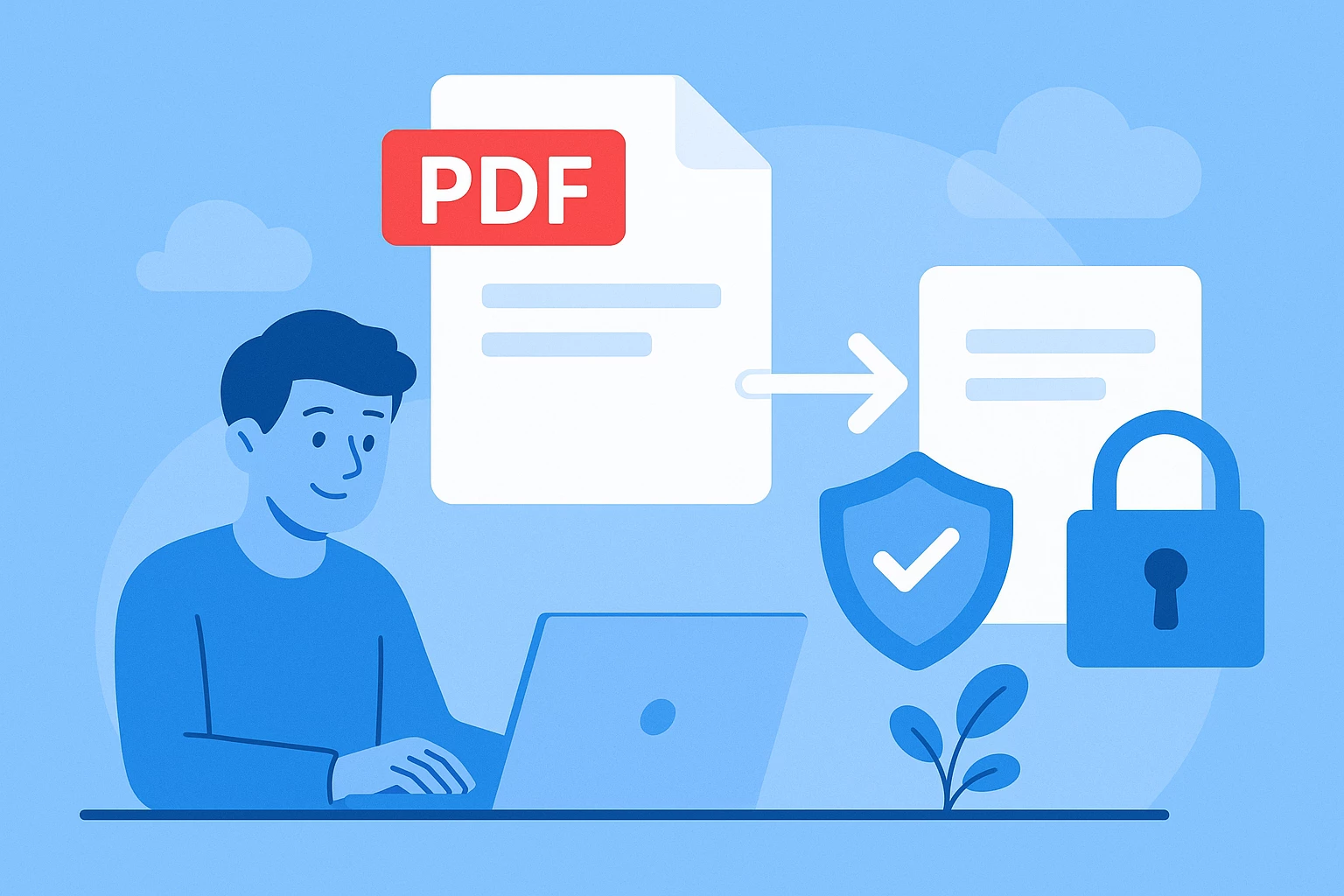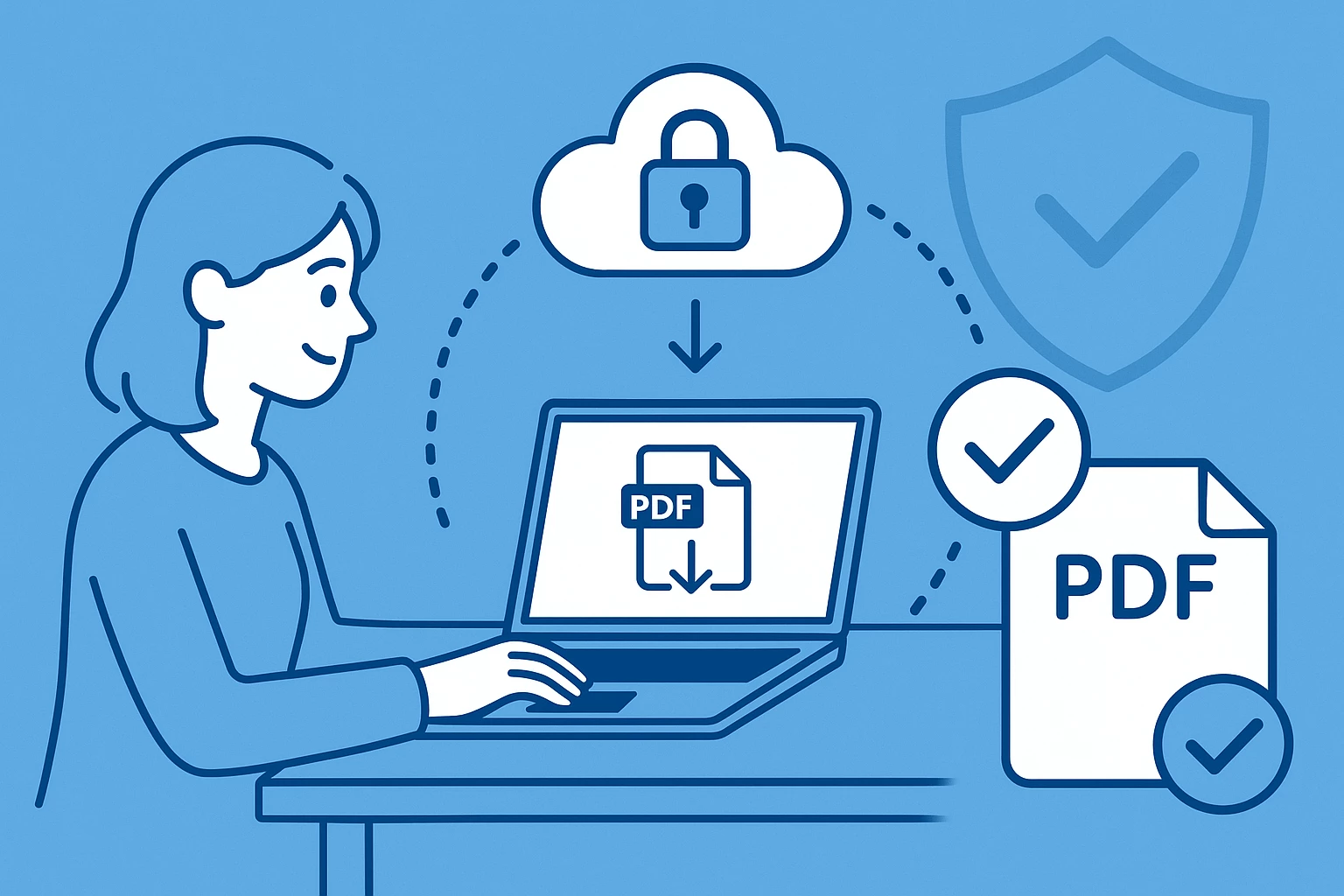
Is Freeconvert Safe? Answered (2025 Edition)
FreeConvert is generally safe to use, but there is more to consider than a simple yes or no. The platform promises secure transfers, quick conversions, and automatic file deletion, yet most users never look beyond those claims. What actually happens to your files after you upload them? How long do they stay on the servers? What risks come with using a free online tool when data privacy has become a serious concern?
In my comprehensive review, I go beyond generic impressions to see how FreeConvert handles file security, from encryption during upload to retention periods and possible exposure through tracking or third-party services.
I also point out warning signs to watch for and share practical tips for keeping your files safe if you rely on online converters for work or personal use.
My goal is to help you understand what FreeConvert offers, where it leaves questions unanswered, and when it might make sense to choose a safer tool instead.

Quick Answer: Is FreeConvert Safe to Use?#
The short answer is yes, FreeConvert is generally safe for everyday file conversions. The platform uses HTTPS for secure connections, supports encryption during transfers, and automatically deletes files after a set period. There are no reports of FreeConvert distributing malware or exposing user data directly through its service.
However, there are important details worth knowing. Files are processed on external servers, not locally on your device, which means you are relying on the platform’s privacy practices. In addition, free online tools can attract copycat websites with similar names or designs, and those may not be safe.
So, while FreeConvert itself is not considered risky, users handling sensitive business documents or personal information should understand its limits and consider whether a platform with stricter privacy controls would be a better fit.
You may also be interested in our Is Convertio Safe? Honest Review (+ A Top-Rated Alternative for 2025) guide
What is FreeConvert?#
I first came across FreeConvert when I needed a quick way to convert a video file without installing extra software. At its core, FreeConvert is a browser-based platform that lets you change file formats directly online.
Additionally, it supports everything from documents and images to audio, video, eBooks, and even compressed archives.

The process is straightforward: you upload a file, select the format you want, and download the converted version once it is ready. There is no complicated setup or learning curve, which is probably why the platform has become so popular for everyday tasks.
Over time, I also noticed that FreeConvert offers a few extra tools like file compression, video trimming, and image resizing. These additions make it convenient for anyone who needs quick edits or conversions without relying on heavy desktop applications.
Privacy and Data Security on FreeConvert#
When I first started using FreeConvert, one of my main questions was what actually happens to the files after you upload them. The platform says transfers are encrypted with HTTPS, so your files are protected while moving between your device and their servers. In my tests, everything felt secure. I did not get any browser warnings or security alerts, which gave me a bit more confidence.
FreeConvert says it deletes files automatically a few hours after processing. I tried the manual delete option as well, and it worked as expected. The files were removed right after I clicked delete, which is helpful if you want control over when your files are erased.
The one thing to keep in mind is that all processing happens on FreeConvert’s servers rather than on your computer. I did not find any reports of breaches, but any time files leave your device, there is a small level of risk.
For casual use, such as converting images, PDFs, or videos, that risk is probably acceptable. For sensitive materials such as contracts or client information, offline tools or platforms with stricter privacy measures are often the better choice.

FreeConvert in Different Use Cases#
FreeConvert is useful in many situations, from personal projects to school assignments and even professional work. Its convenience makes it appealing for anyone who needs quick file conversions without installing software or dealing with complex settings.
However, the level of safety you get depends on the type of files you handle and how much privacy control you need. Some tasks are perfectly fine for an online converter, while others call for more secure or specialized tools.
In the upcoming sections, I’m going to break down how FreeConvert performs for personal, professional, and everyday use so you can decide where it fits best.
Safe for Personal Use (Photos, Music, Small Documents)#
When I tried FreeConvert with personal files like photos from my phone, a few music tracks, and some small PDFs, the process was straightforward. The uploads were quick, the conversions finished without errors, and the files were automatically deleted from the servers within the promised time window.
I further tested the manual delete option to make sure it worked, and the files disappeared right after I clicked remove.

For personal use, where the files do not contain sensitive or private information, FreeConvert feels safe enough. It is especially convenient for tasks like resizing images, converting music formats, or compressing small documents without installing any software.
Don’t miss our Is Cloudconvert Safe? Safety Review (+ A Trusted Alternative) guide
Safe for Professional Use (Client Work, Sensitive Files)#
For professional work, FreeConvert offers some basic protections. It encrypts files during transfer and removes them after processing, which covers the needs of regular documents.
The limitation comes from the fact that everything is processed on FreeConvert’s servers rather than on your own device. That setup means your files leave your direct control, even if only for a short time.
If you are handling client contracts, financial data, or confidential business records, that temporary exposure may not meet the security standards your work requires. In those situations, offline tools or platforms built for secure enterprise use would be a better choice than a general-purpose online converter.
Safe for Students and Casual Users#
For students and casual users, FreeConvert is usually more than enough. Assignments, eBooks, presentations, and similar files converted quickly during testing, and the automatic deletion policy worked as expected.
Furthermore, the free plan covers most basic needs, so there is no requirement to pay for a subscription unless you are dealing with very large files or frequent conversions.
As long as the documents do not contain sensitive personal information, FreeConvert offers a simple way to handle everyday file conversions without installing extra software or going through a complicated setup process.

User Reviews and Real-World Feedback#
To see how FreeConvert works for other people, I went through reviews and user discussions online. Most users like how easy it is to use. They mention that it is quick, works right in the browser, and does not ask you to install anything or create an account for basic conversions.
There are a few complaints, mostly about the strict no-refund policy on paid plans and slower speeds when dealing with very large files on the free version.
Aside from those points, I did not find reports of security problems or data leaks, which is reassuring for anyone worried about file safety.

Overall, the feedback lines up with my experience. FreeConvert does what it promises for everyday tasks, but it is not the best choice for anyone handling sensitive documents or relying on it for heavy, frequent use.
Pros and Cons of Using FreeConvert for File Safety#
After spending time with FreeConvert and reading through real user experiences, the platform’s strengths and weaknesses became clear to me. It has a lot going for it if you use it the right way, but there are also situations where it is not the best choice.
Main Advantages#
One thing I liked about FreeConvert is how simple it is to use. I did not have to install anything or sign up for an account. I uploaded a few files, picked the format I needed, and got the converted versions within minutes.
Likewise, it works on any device with a browser, so I was able to use it both on my laptop and phone without any trouble.

It also supports a wide range of formats. During my tests, I converted PDFs to DOC files, compressed images for sharing, and even changed a few music files into different formats. Everything worked smoothly.
For everyday tasks like these, FreeConvert does exactly what most people expect from a free online converter.
You can also explore our Is Zamzar Safe? Safety Review (+ Pros, Cons & Alternatives) guide
Potential Risks (Privacy, File Size Limits, Ads)#
The biggest trade-off is privacy. All files go through FreeConvert’s servers rather than staying on your own computer. The platform encrypts transfers and deletes files after a set period, but once data leaves your device, there is always some level of risk.
If you are working with personal or sensitive information, that is something to think about.

The free plan also has file size limits. When I tried uploading a large video file, I ran into restrictions pretty quickly. On top of that, the free version sometimes shows ads, which is not a dealbreaker but can be distracting if you use the platform often.
Who Should Avoid FreeConvert#
If you work with confidential materials like client contracts, financial reports, or anything covered by strict privacy requirements, FreeConvert probably is not the right tool.
Offline software or secure platforms built specifically for handling sensitive files will give you better control and stronger security. FreeConvert is built for convenience and everyday tasks, not for the highest levels of data protection.
Top-Rated Alternative to FreeConvert#
If you are looking for a file converter that feels faster, safer, and easier to use than FreeConvert, MConverter is the option I recommend in 2025. It keeps the simplicity people like about FreeConvert while adding better privacy controls, smoother performance, and features that make a real difference for frequent use.

MConverter encrypts every file transfer and deletes files automatically within four hours after processing. If you prefer to remove them right away, you can do that yourself. Having this level of control makes it more reassuring to use, especially when handling personal documents or work projects.
It also performs very well. MConverter can process large files and convert hundreds at once without slowing down. The site is free of ads and pop-ups, so the experience stays clean and focused. You upload your files, choose the format, and get your results quickly.
The platform supports a wide range of formats, including documents, images, videos, audio, and archives, and it works smoothly on both desktop and mobile. Many users point out how easy it is to use and how much faster it feels compared to other converters they have tried.

If you want a converter that keeps things simple but also takes security and performance seriously, MConverter is the smarter choice over FreeConvert in 2025.
You can also read our Top 10 Cloudinary Alternatives for 2025 (Free & Paid) guide.
Expert Tips to Stay Safe When Using FreeConvert#
After using FreeConvert for a while, I realized that a few simple habits can make the whole experience safer and smoother. These are the steps I follow every time, and they have helped me avoid the little mistakes that can turn into bigger problems later.
1. Always Double-Check the Website URL#
The very first thing I do is make sure I am on the official FreeConvert site. It takes two seconds to glance at the address bar and confirm the secure connection with https.

I learned this the hard way years ago when I accidentally used a copycat site that was full of ads and felt shady from the start. Since then, I have never skipped this step.
2. Avoid Uploading Files With Sensitive Information#
Even though FreeConvert encrypts transfers and deletes files automatically after a few hours, I do not upload anything that contains personal or client information.
For me, contracts, invoices, or anything private stay on my computer, and I use offline tools for those. It is just not worth the risk.
3. Use the Manual Delete Option#
One feature I like about FreeConvert is the option to delete files yourself right after downloading them. I always click delete as soon as I have the converted file saved.
It gives me peace of mind knowing my files are gone instantly instead of waiting for the automatic timer to remove them.
4. Scan Downloaded Files Before Opening Them#
I started scanning files as a habit after a coworker once opened an infected document that spread malware through our entire team’s shared drive.
A file converter will not clean an infected file, so now I quickly scan anything I download before opening it or sending it to someone else. It takes only a few seconds and saves a lot of trouble.
5. Keep File Sizes Manageable#
FreeConvert handles smaller files much faster, and the free plan has clear limits on size anyway. I have had large video files fail halfway through before, so now I split big projects into smaller parts.
It makes everything process faster, reduces errors, and keeps my folders more organized when I download the results.
The Bottom Line: Should You Trust FreeConvert in 2025?
FreeConvert handles everyday file conversions well. It is simple to use, works directly in the browser, and supports a wide range of formats without requiring extra software. For tasks like converting images, small documents, or music files, it gets the job done quickly and with minimal effort.
Plus, the automatic deletion policy and encrypted transfers provide it with a level of security that many free tools often lack.
Even so, there are limits to what it can offer. Because files are processed on FreeConvert’s servers, not locally on your device, there is always a small risk any time data leaves your control.
The free plan has size restrictions, and for anything sensitive like client contracts or financial records, relying on an online converter is not the safest approach.
For casual use, FreeConvert works fine in 2025. If you handle larger projects, need batch processing, or want stronger privacy protections, MConverter stands out as a faster and more secure alternative without adding complexity.
Is FreeConvert Free From Viruses?#
FreeConvert itself does not spread viruses or malware. In my tests, there were no suspicious downloads or security warnings, and independent checks rate the official site as safe to use.
The real risks come from copycat websites or files that were already infected before uploading. Always check the URL to make sure you are on the real FreeConvert site, and run a quick antivirus scan on any file you download to stay safe.
Does FreeConvert Keep My Files?#
FreeConvert does not store your files permanently. According to its policy, all files are automatically deleted from the servers within a few hours after processing, and you can remove them yourself immediately if you prefer.
In my tests, the manual delete option worked as promised, and files were no longer accessible after the set time window. For everyday use, this setup provides a reasonable level of privacy, but highly sensitive documents are still better handled offline.
Can FreeConvert Handle Confidential Documents Safely?#
FreeConvert encrypts files during transfer and removes them from its servers after a few hours, which provides a basic level of security for everyday use. In my tests, files were deleted within the promised timeframe, and I did not see any reports of data leaks or unauthorized access.
However, because files are processed on FreeConvert’s servers rather than locally on your computer, there is always some risk when handling sensitive information. For confidential documents such as legal contracts, financial records, or client data, offline tools or platforms built specifically for secure file management are a safer choice.
Is FreeConvert Safe for Business Use?#
FreeConvert works well for routine tasks like converting marketing materials, presentations, or non-confidential reports. It uses encryption during transfers and deletes files within a few hours, which offers a basic level of protection for general business documents.
However, for companies handling sensitive client data, financial records, or any files subject to strict compliance requirements, an offline tool or a platform designed for secure file management would be a better fit. FreeConvert is built for convenience rather than enterprise-level security needs.
Does FreeConvert Sell My Data?#
According to FreeConvert’s privacy policy, the platform does not sell user data to advertisers or third parties. Files are used only for the conversion process and are automatically deleted after a set period.
In my tests, I did not see any signs of tracking beyond basic analytics, and there were no reports of data being shared or misused. For everyday file conversions, FreeConvert does not appear to engage in practices that compromise user privacy.
Are There File Size Limits That Affect Safety?#
FreeConvert has file size limits, especially on the free plan, but these restrictions do not affect the security of your files. They only determine how large a file you can upload at once and how quickly the platform can process it.
In my experience, smaller files upload faster and are less likely to time out, but the same encryption and deletion policies apply no matter the size. Safety does not change whether you are converting a small document or a larger media file.
How Long Does FreeConvert Store Uploaded Files?#
FreeConvert automatically deletes files from its servers a few hours after processing. You can also remove them manually right after downloading if you prefer not to wait for the automatic deletion.
When I tested the platform, files were gone within the promised timeframe, and I did not find any reports of data being stored longer than stated. For everyday use, this setup provides a reasonable level of privacy.
Can I Use FreeConvert Without Creating an Account?#
Yes, you can use FreeConvert without creating an account. Most basic features, including file conversions and manual file deletion, are available directly in the browser with no registration required.
I tested the platform without signing up and was able to convert files quickly and use all the standard options. Accounts mainly come into play for paid plans or advanced features like larger file size limits and batch processing.
About the author
Mihael joined MConverter as a co-founder in 2023, bringing a vision to transform a tech tool into a product company built around meaningful user experience. With roots in B2B sales, product development, and marketing, he thrives on connecting the dots between business strategy and customer needs. At MConverter, he shapes the bigger picture - building the brand, inspiring teams, and pushing innovation forward with a can-do mindset. For Mihael, it’s not just about file conversions, but about creating experiences that deliver real impact.
Check out more articles

Is Anyconv Safe: Anyconv Review – Is It Safe or Risky?

Is iLovePDF Safe? In-Depth Review – Is It Safe or Should You Avoid It?












